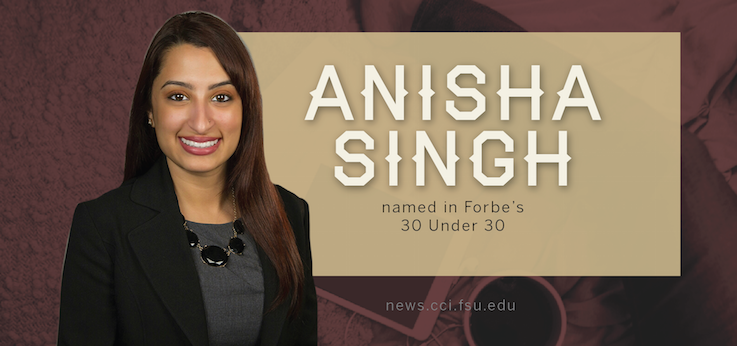
Anisha Singh (B.A. ’09) began her successful law career almost immediately after stepping onto campus in 2005. Her impressive law career has landed her a feature in Forbes’ 30 Under 30 list for law and policy.
While at FSU, Singh took advantage of the Student Government Association opportunities that were presented to her, serving as a student body Senator, Office of Legislative Affairs chairwoman and an FSU Student Alumni Association volunteer. She also spearheaded a campaign to mobilize students at FSU, FAMU and TCC to vote in the 2008 general election. Singh topped off her extraordinary college experiences by holding internships with Senator Dave Aronberg and Governor Charlie Crist.
Singh says, “I am so grateful for talented and passionate professors and mentors in the Communication department, such as Mark Zeigler and Jeanette Castillo, and student government and leadership mentors like Joyce Howard and Laura Osteen.”
Two tragic events assured Singh that she was interested in public interest and civil rights law, beginning with the social injustice she saw after September 11th. Later on in 2006, she heard of a Sikh inmate who was being transferred to a Florida prison where he would be required by law to cut his hair. This would violate his religious rights. She went on to create a resolution to transfer the inmate to a Vermont prison where he would be able to observe his religion. The SGA Senate passed the resolution and she went on to lobby with it to the Florida Legislature.
After earning her Communication Studies degree at FSU, Singh went on to earn her J.D. at the University of Virginia School of Law. She focused on civil rights law, serving underrepresented communities and volunteering for Sikh organizations.
Singh explains, “I became a full-time Sikh rights advocate, representing the community in White House and interagency conferences to address hate crimes towards Sikh Americans, fighting legal cases for victims of discrimination and hate and advancing legislation to benefit Sikh victims of bullying and discrimination in schools and the workplace.”
In fact, Singh received her place in the Forbes 30 Under 30 list largely for winning a historic anti-discrimination case against the U.S. Army, which had had previously lacked religious accommodsation. A 19-year-old Sikh male had repeatedly been denied acceptance into his university’s ROTC program. With her position single-handedly managing the Washington, D.C. Chapter of the international policy division of United Sikhs, Singh was able to help manage his case. As a result of the case, the U.S. Army created a procedure for individuals to request religious accommodations to join.
In addition to winning this impressive case, Singh has also founded the national Anti-Bullying Campaign in partnership with the White House Anti-Bullying Initiative and acted as sole counsel for female clients seeking legal status under the Violence Against Women Act. As a member of the Immigration Clinic at the University of Virginia School of Law, she was handed a complex case involving a victim of domestic abuse. Despite the slim chance that the case would be won in the woman’s favor, Singh was able to successfully defend the woman’s case for legal status and the chance to live and work in America under the Violence Against Women Act.
She also currently works as the Campaign Manager for the Center for American Progress (CAP) legal progress team. A typical day consists of attending back-to-back meetings, coordinating and brainstorming messaging and communication strategy and researching and writing op-eds and reports to create a voice for the millions of Americans who are unable to access justice.
Singh shares, “I like to think I am shaping the conversation around our nation’s judicial process by managing unprecedented grassroots organizing efforts across the country to educate Americans on the need to fill judicial vacancies so that historic backlogs can be remedied and cases may be heard in a timely manner.
In the rare moments when Singh has spare time, she loves to bake, discover Washington, D.C.’s hidden gems and explore new countries and cultures by traveling. She also serves on the executive board of the FSU Asian American Alumni Association. In five years, she sees herself continuing to work in social justice in Washington, D.C, hopefully growing a louder and more influential voice for the communities that need their voices heard the most.
To learn more about the Communication programs offered by FSU, follow this link.

